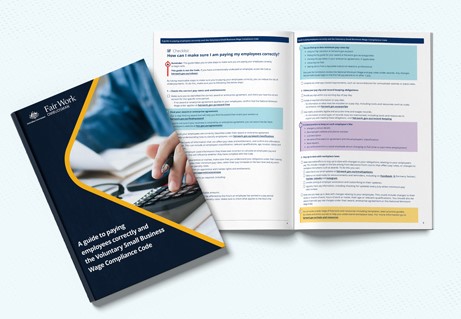Voluntary Small Business Wage Compliance Code
A small business employer can’t be referred for criminal prosecution by us if we’re satisfied that they’ve complied with the Voluntary Small Business Wage Compliance Code (Code).
On this page:
- What is the Code
- How to comply with the Code
- What happens when we decide the code is satisfied
- Tools and resources
- Related information

Our Guide to paying employees correctly and the Voluntary Small Business Wage Compliance Code Voluntary Small Business Wage Compliance Code can help businesses to understand the Code. It offers practical advice and tools including a handy checklist, examples and best practice tips.
What is the Code
From 1 January 2025, intentionally underpaying an employee’s wages or entitlements can be a criminal offence. This doesn’t include honest mistakes.
We can’t refer a small business employer’s conduct for possible criminal prosecution if we’re satisfied that they’ve complied with the Code in relation to an underpayment.
A small business employer will comply with the Code if they don’t intend to underpay their employees. This will be assessed by looking at several factors. These factors aren’t new to compliant employers. Instead, they’re steps many already take as part of good business practice. Find out more at How to comply with the Code.
Even if an employer has complied with the Code, civil actions such as issuing a compliance notice or an enforceable undertaking may still be taken and civil penalties may still apply.
![]() Download the:
Download the:
How to comply with the Code
A small business employer will comply with the Code if the underpayment wasn’t intentional.
Intentional conduct includes:
- taking an action, such as paying less than an employee’s minimum entitlements on purpose
- failing to take an action, such as not paying an employee on purpose.
The Code isn’t a checklist. This means that a small business employer doesn’t need to show they meet all the factors. There is also not one factor that must be met to have complied with the Code.
Where an underpayment has occurred, we’ll look at the overall picture and the business’ particular circumstances to determine whether the Code has been satisfied.
Tip - How to understand the Code
Use our Guide to paying employees correctly and the Voluntary Small Business Wage Compliance Code Guide to paying employees correctly and the Voluntary Small Business Wage Compliance Code to:
- help pay your employees correctly
- understand how the Code applies.
The Guide offers practical advice and tools including a handy checklist, case studies and best practice tips.
The table below shows the factors that are set out in the Code.
| Factors include whether the employer has: | Example |
|---|---|
| Taken reasonable steps to work out correct pay rates and entitlements. | This may include checking the relevant award or enterprise agreement or confirming that the National Minimum Wage Order applies. |
| Made reasonable effort to stay up to date with changes to their obligations, including in workplace laws. | This may include subscribing to our email updates to stay up to date on changes to any relevant awards including pay rate increases. |
| Checked and relied on employee information the employer reasonably believed was accurate in relation to paying wages. | This may include relying on accurate information about the employee when checking they’ve been classified correctly based on their role and duties, or that they’re being paid correctly for their age. |
| Sought information or advice from a reliable source about paying employee entitlements correctly. | This may include seeking advice from an employer association, lawyer, us, or the Fair Work Commission. |
| Provided information when seeking information or advice that the employer reasonably believed was accurate. | This may include seeking advice or information from a reliable source, making sure to give that source the correct information about an employee like their classification and age. |
| Taken steps to fix the underpayment. | This may include repaying an amount as soon as possible and taking steps to prevent the same issue from happening again. |
| Cooperating with any inquiry or investigation that we may conduct about the underpayment. | This may include responding to our calls and emails and engaging with us throughout the inquiry or investigation as needed. |
| Other factors that might be relevant, such as what led to the underpayment or how the employer became aware of the underpayment. | A payroll error being identified during a quarterly business audit. |
What happens when we decide the Code is satisfied
We will give the employer written notice of a decision about whether they’ve satisfied the Code or not.
If an employer satisfies the Code, we can’t refer the employer’s conduct for possible criminal prosecution. We may still consider civil enforcement options if necessary. For example, a:
Compliance with the Code also means we can’t enter into a cooperation agreement with the employer. For more information, visit Cooperation agreements.
The Code doesn’t affect any of our other powers or functions, or the powers of our inspectors.
Source reference: Fair Work Act 2009, ss 327A and 327B.
Tools and resources
- Voluntary Small Business Wage Compliance Code
- Guide to paying employees correctly and the Voluntary Small Business Wage Compliance Code Guide to paying employees correctly and the Voluntary Small Business Wage Compliance Code
- Compliance and Enforcement PolicyCompliance and Enforcement Policy
- Legal Professional Privilege Policy